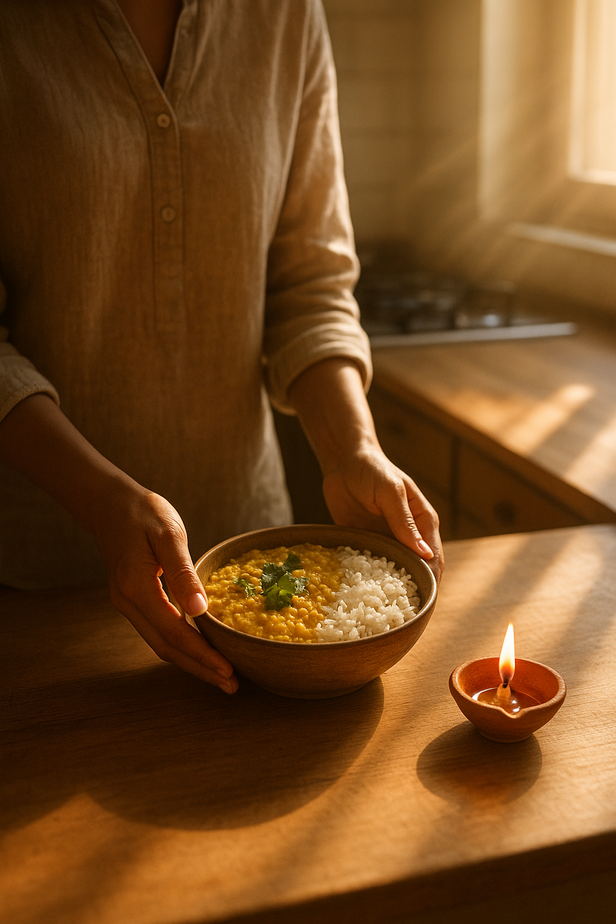Finding God in Daily Chores: Turning Routine into a Spiritual Practice
Charu Sharma | Aug 26, 2025, 05:11 IST
( Image credit : Timeslife )
Spirituality is not the only thing that is found in temples or from rituals. It can also be seen in the smallest chores of daily life. These activities which people usually overlook as part of their life such as cooking, cleaning, washing, and even walking to the market contain the teachings of being mindful, humble, and devoted. By changing one's outlook, these day-to-day chores become holy works, giving us a feeling of thankfulness, understanding, and inner tranquility. Maybe it is the case that God has always been with us in the normal.
Very often spirituality is thought of as something that is done in temples, meditation rooms, or during complex rites. We associate it with silence, incense, chanting, and an absolute withdrawal from all the hustle and bustle of everyday life. However, spirituality is not something different from what is normal; it is still there right in the tiniest of the moments. The philosophy of ancient India has been declaring the concept of karma yoga from the beginning - that a simple act done with awareness, devotion, and selflessness can lead one to the divine. Life for most of us is a series of events that pass by so quickly that we hardly notice them. We usually don't feel that washing dishes, folding clothes, cooking, or cleaning are sacred activities - rather, they are like heavy burdens on our shoulders. However, through these monotonous tasks, one can establish the potential of relationship with others, encompassing and being above the material world. We do not necessarily have to "perform" the chores, instead, we can carry them out as a part of our prayer and meditation - which means that we "accomplish not only the work at hand but also we feed our inner self". This piece is all about how to find the divine in everyday life by using the methods of one or another discipline that are (1) ancient wisdom, (2) psychology, and (3) lived experience.

In nearly all cultures, food is venerated. In India, the kitchen is regarded as a temple itself, and food (anna) is accepted as a form of prasada- a gift from the gods. However, contemporary cooking is often perceived as rushed, impersonal, or even irritating. When we prepare food with awareness, affection, and thankfulness, every mixing of the spoon is a ritual. One can view cooking as making an offering, not to the family only but the divine within them. The Bhagavad Gita teaches that consumption of food which is not first offered to God causes bondage, whereas food offered with love is set free. Have your cooking session start with a small prayer or a thought of gratitude. Immerse yourself in the sensory experience of the food- touching, smelling, hearing and let the act bring you back to the present moment. Do not allow the feeling of anger to take over - see the food as a source of your life which is being nurtured, and not merely the plates are being filled.

Dust gets inside our homes and in the same way negative thoughts fill our minds. These domestic chores like sweeping, mopping, or dusting may seem dull and monotonous, yet they are powerful symbols for purifying the inner self. Indian customs associate the purity of the body with the purity of the spirit-what could be the reason that temples are being washed daily and altars are being wiped before the prayer? When we see cleaning as an act that removes both physical and mental debris, it changes our approach to the task and, therefore, becomes a spiritual practice. Each broom stroke or wipe can be a symbol of release of mental heaviness, old resentments, or stress. You can try cleaning with concentration on your breathing and the rhythm of your movements. While you are cleaning , picture that you are removing fear, anger, and worries that are old. To make your cleaning ritual more holy, you can either burn incense or play soft chants.

Once upon a time in ashrams, followers used to wash their guru's clothes as a part of seva (selfless service). This wasn't an act about laundry, but it was about surrender and humility. Today, washing clothes can still hold powerful symbolism: the stains disappear, and fabric becomes new - just like life giving us opportunities to clean our ego, pride, and negativity. What if you don't perceive laundry as a boring work but as the removal of the heavy layers of your heart? Soap and water are your instruments of re-creation, just like introspection and benevolence that cleanse your character. When you are scrubbing or putting clothes in the machine, let go of one negative thought. See the water run and feel that your tension is leaving with it. Give thanks to the clothes you own and the shelter they offer you.

The first option is that pilgrimages are these long journeys going to a sacred place. However, even a short walk to the store or the neighbor's place can become a spiritual practice if done with awareness. In fact, walking has been a common practice in different religious traditions-Buddhist monks engaging in walking meditation, Hindus doing parikrama around temples- as an activity that involves the body, the mind and the spirit. Instead of rushing, use each step as a mantra. The cadence of your steps can be like prayer beads, which keep you connected to the present moment. Every person you meet becomes a reminder of God in each face. Walk slowly, paying attention to your breath and what is around you. Give silent blessings to those who you meet during your walk. Have an attitude of amazement-finding the sacred in the trees, shops, or even in the disorder.
So in conclusion : The divine doesn’t live only in big rituals or far-off temples: it is there in the course of your day-to-day life. Cooking, cleaning, washing, or walking may seem like simple things, but when they are done with awareness and respect, they turn into sacred paths. The key is viewpoint: recognizing each deed as a gift, every job as service, and every instant as an opportunity to link with something beyond you. By changing “I have to do this” to “I get to do this,” spirituality becomes an integral part of life. The great saint Kabir also said, “Dhoondhe re ban ban, main toh ghar hi paaya Ram.” (They searched in forests, but I found God in my own home.) Perhaps the divine has been there the whole time-not in the far-off shrines but in the sound of the vessels, the swish of the broom, the smell of the new food, and the rhythm of your daily chores.
1. Cooking as an Offering, Not a Task

Food as an offering
( Image credit : Times Life Bureau )
In nearly all cultures, food is venerated. In India, the kitchen is regarded as a temple itself, and food (anna) is accepted as a form of prasada- a gift from the gods. However, contemporary cooking is often perceived as rushed, impersonal, or even irritating. When we prepare food with awareness, affection, and thankfulness, every mixing of the spoon is a ritual. One can view cooking as making an offering, not to the family only but the divine within them. The Bhagavad Gita teaches that consumption of food which is not first offered to God causes bondage, whereas food offered with love is set free. Have your cooking session start with a small prayer or a thought of gratitude. Immerse yourself in the sensory experience of the food- touching, smelling, hearing and let the act bring you back to the present moment. Do not allow the feeling of anger to take over - see the food as a source of your life which is being nurtured, and not merely the plates are being filled.
2. Cleaning as Clearing the Inner Mind

Person cleaning
( Image credit : Times Life Bureau )
Dust gets inside our homes and in the same way negative thoughts fill our minds. These domestic chores like sweeping, mopping, or dusting may seem dull and monotonous, yet they are powerful symbols for purifying the inner self. Indian customs associate the purity of the body with the purity of the spirit-what could be the reason that temples are being washed daily and altars are being wiped before the prayer? When we see cleaning as an act that removes both physical and mental debris, it changes our approach to the task and, therefore, becomes a spiritual practice. Each broom stroke or wipe can be a symbol of release of mental heaviness, old resentments, or stress. You can try cleaning with concentration on your breathing and the rhythm of your movements. While you are cleaning , picture that you are removing fear, anger, and worries that are old. To make your cleaning ritual more holy, you can either burn incense or play soft chants.
3. Washing Clothes, Washing Away Ego

Clean clothes hanging
( Image credit : Times Life Bureau )
Once upon a time in ashrams, followers used to wash their guru's clothes as a part of seva (selfless service). This wasn't an act about laundry, but it was about surrender and humility. Today, washing clothes can still hold powerful symbolism: the stains disappear, and fabric becomes new - just like life giving us opportunities to clean our ego, pride, and negativity. What if you don't perceive laundry as a boring work but as the removal of the heavy layers of your heart? Soap and water are your instruments of re-creation, just like introspection and benevolence that cleanse your character. When you are scrubbing or putting clothes in the machine, let go of one negative thought. See the water run and feel that your tension is leaving with it. Give thanks to the clothes you own and the shelter they offer you.
4. Walking to the Market as a Pilgrimage

Person walking through market
( Image credit : Times Life Bureau )
The first option is that pilgrimages are these long journeys going to a sacred place. However, even a short walk to the store or the neighbor's place can become a spiritual practice if done with awareness. In fact, walking has been a common practice in different religious traditions-Buddhist monks engaging in walking meditation, Hindus doing parikrama around temples- as an activity that involves the body, the mind and the spirit. Instead of rushing, use each step as a mantra. The cadence of your steps can be like prayer beads, which keep you connected to the present moment. Every person you meet becomes a reminder of God in each face. Walk slowly, paying attention to your breath and what is around you. Give silent blessings to those who you meet during your walk. Have an attitude of amazement-finding the sacred in the trees, shops, or even in the disorder.
So in conclusion : The divine doesn’t live only in big rituals or far-off temples: it is there in the course of your day-to-day life. Cooking, cleaning, washing, or walking may seem like simple things, but when they are done with awareness and respect, they turn into sacred paths. The key is viewpoint: recognizing each deed as a gift, every job as service, and every instant as an opportunity to link with something beyond you. By changing “I have to do this” to “I get to do this,” spirituality becomes an integral part of life. The great saint Kabir also said, “Dhoondhe re ban ban, main toh ghar hi paaya Ram.” (They searched in forests, but I found God in my own home.) Perhaps the divine has been there the whole time-not in the far-off shrines but in the sound of the vessels, the swish of the broom, the smell of the new food, and the rhythm of your daily chores.
FAQs (Frequently Asked Questions) :
- Can daily chores really be considered spiritual practices?
Yes, when done mindfully with gratitude, chores can become acts of devotion. - Why is cleaning linked to inner clarity?
Because removing physical dust mirrors releasing mental and emotional clutter. - Can spirituality exist outside temples and rituals?
Absolutely, true spirituality can be found in everyday actions and moments.
